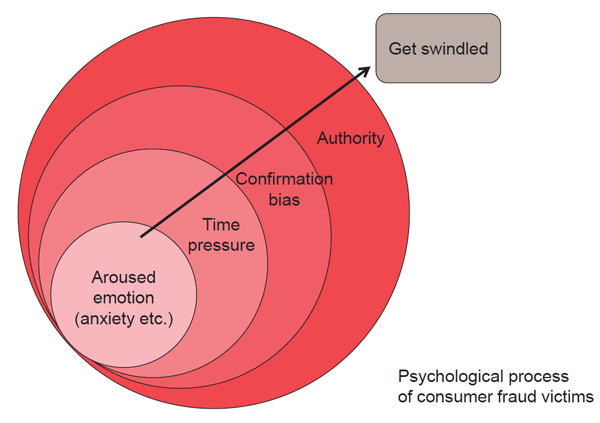Columns
Column
The White Paper provides 13 columns focusing on hot topics.
Elderly victims of consumer fraud: Psychological mechanism in fraudulent schemes
Manabu Akiyama, Professor
Department of Psychology, Kobe Gakuin University
Consumer fraud targeting senior citizens is showing no sign of slowing down. Elderly consumers are falling victim of remittance fraud (known as "furikome sagi" in Japanese) and fraudulent money-making opportunities offered by deceptive brokers of prelisted shares and foreign investment products. Frauds continue to occur despite wide publicity about fraudulent business schemes not only on TV and in newspapers but even in skits played at senior citizens’ colleges. This is because con artists take advantage of people’s bias in perceiving and estimating the situation around them. The chart below shows the psychological process of elderly people getting tricked by malicious business methods carefully designed to exploit their bias.
A call about a crisis situation for your family member or the suspension of your bank account would drive your anxiety and fear. Unexpected rewards such as the acquisition of prelisted shares would bring you delight and happiness. While you are overwhelmed with an unexpected arousal of emotions (evocation), con artists would give you no time to think, urging you to pay, sign a contract, or hand in the passbook/bank card immediately. When you are emotional in a situation under time pressure, you tend to think by intuition. Intuition lets you make quick and good decisions, but it has pitfalls for its simplicity. In an emotional and urgent situation, you often resort to quick and shortsighted decisions, such as leaping at the first solution available and paying no attention to the background and surrounding information of the malicious solicitation. Furthermore, you are more likely to justify your misled belief (confirmation bias), for example, by making a confirmation call to the person who is actually a swindler. You may even restructure your situational perception to make it consistent with the wrong belief. Recent studies show that elderly people are more likely to regard others as trustworthy. To give more reality to their false stories, con artists also abuse authority, such as pretending to be a police officer. Just like a stage director good at exciting an audience or attracting their interest, con artists make Column The White Paper provides 13 columns focusing on hot topics. up stories to prevent their targets from thinking logically. Scenarios for fraudulent business schemes are ideally structured to take advantage of elderly people, and this is probably why they fall prey to fraud so easily. The approach of inviting and asking are also used effectively, which are practices that many people commonly experience in their community and family lives. Swindlers are so tactical that they exploit the emotions of older people, such as joy, anger, sorrow and pleasure, to prevent their targets from carefully considering the offer and thus cajole them into making payments without hesitation.



